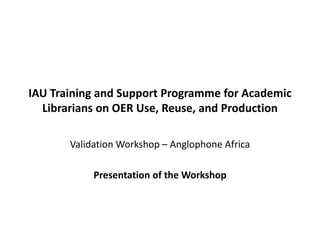Isabelle Turmaine - Presentation 1 - Presentation of the Workshop
- 1. IAU Training and Support Programme for Academic Librarians on OER Use, Reuse, and Production Validation Workshop ŌĆō Anglophone Africa Presentation of the Workshop
- 2. Outline of presentation ŌĆó ŌĆó ŌĆó ŌĆó ŌĆó ŌĆó What is a Validation Workshop? Why Open Educational Resources (OER)? Why academic librarians? The objectives of the Workshop The organisation of the Workshop Who are we?
- 3. What is a Validation Workshop? ŌĆó Validation ┬½the process of determining the degree to which a model (ŌĆ”) is an accurate representation of the real world from the perspective of the intended uses of the model (ŌĆ”)ŌĆØ thefreedictionnary.com ŌĆó Workshop ┬½ An educational seminar (ŌĆ”) emphasizing interaction and exchange of information among a usually small number of participantsŌĆØ thefreedict ionary.com ŌĆó Hence a Validation Workshop is: A meeting in which a small group of professionals representing the target group of a project discusses its appropriateness and potential efficiency in regards to context and needs ,while enhancing their knowledge through information, practices, and ideas sharing.
- 4. Why Open Educational Resources (OER)? ŌĆó Definition Digtized, as well as non-digitized, teaching and learning materials either openly released or released in the public domain that can be used, adapted and reused by all, everywhere. ŌĆó Keywords Free of charge; Portable; Adaptable ŌĆó Might be a solution to: ŌĆō Reach a larger population of students regardless of location, available space, lack of teachers, disability, age, professional activity, time; ŌĆō Develop lifelong learning; ŌĆō Advance knowledge.
- 5. Why academic librarians? ŌĆó OER are linked to the Open access movement, supported by librarians worldwide from its inception; ŌĆó OER are, at the moment, mostly developed at university level; ŌĆó Despite their advantages, OER are not as widespread as expected, Academic librarians, because of their position at the core of higher education institutions, could be the right go between for their development; ŌĆó Librarians need to reposition their activities within increasingly connected information societies; ŌĆó LibrariansŌĆÖ training is OER-related: they are taught how to search for the right information on a variety of supports; train people to find appropriate information; deal with copyright issues; manage repositories; and index documents for dissemination and easy retrieval .
- 6. The objectives of the Workshop The objectives of the Workshop are to: - Update everyoneŌĆÖs knowledge on OER (Catherine Ngugi, OER Africa, Kenya; UNESCO; and Susan dŌĆÖAntoni, Athabasca University; UNESCO OER Chair, Canada); - Collectively reflect on OER use, re-use , and production (Pascal Hoba, Association of African Universities, Ghana; Buhle Mbambo Thata, University of South Africa); - Provide feedback on IAUŌĆÖs proposal of a Training and Support Programme for academic librarians in the field (Isabelle Turmaine, International Association of Universities, France).
- 7. The organisation of the Workshop The Workshop is designed so as to be: - Homogeneous (only academic librarians) and heterogeneous (not the same level of OER knowledge); - Participative and highly interactive (3 group discussions); - Concrete and to the point (discussion on a prospective project); - Hopefully, a first step in a bigger project. The Workshop takes place on two days: ŌĆō The first day is devoted to information sharing; ŌĆō The second day to projects and proposals.
- 8. The organisation of the Workshop ŌĆó Day I starts with a keynote presentation on OER use and usability for Africa and continues with one group discussion on OER localization and use and a report on the sustainability study of a world map of OER initiatives. A convivial dinner, at the invitation of AAU, will follow. ŌĆó Day II will start with a second discussion group on OER production and dissemination, followed by a presentation of UNESCOŌĆÖs activities in the field. We will then discuss the IAU OER project and everyone will be offered the opportunity to give his/her feedback on the Workshop. Drinks to thank you and wish you all a safe trip back home will close the Workshop. ŌĆó LetŌĆÖs begin now by introducing ourselves for ease of discussion.








